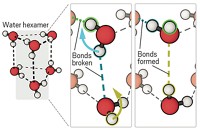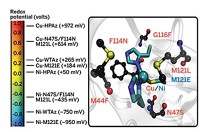Advertisement
Grab your lab coat. Let's get started
Welcome!
Welcome!
Create an account below to get 6 C&EN articles per month, receive newsletters and more - all free.
It seems this is your first time logging in online. Please enter the following information to continue.
As an ACS member you automatically get access to this site. All we need is few more details to create your reading experience.
Not you? Sign in with a different account.
Not you? Sign in with a different account.
ERROR 1
ERROR 1
ERROR 2
ERROR 2
ERROR 2
ERROR 2
ERROR 2
Password and Confirm password must match.
If you have an ACS member number, please enter it here so we can link this account to your membership. (optional)
ERROR 2
ACS values your privacy. By submitting your information, you are gaining access to C&EN and subscribing to our weekly newsletter. We use the information you provide to make your reading experience better, and we will never sell your data to third party members.
Analytical Chemistry
Tweaked Protein Conducts Electrons Faster
Making residue interactions around azurin’s copper center more flexible boosts electron-transfer efficiency
by Stu Borman
June 24, 2013
| A version of this story appeared in
Volume 91, Issue 25
Making an electron-transfer protein more flexible can help it conduct electrons more readily. This finding could help researchers improve the efficiency of energy-conversion processes such as photosynthesis and respiration. A theory developed by Rudolph A. Marcus of Caltech, for which he won the 1992 Nobel Prize in Chemistry, states that lowering a protein’s reorganization energy—the energy required to rearrange a protein’s internal structure during electron transfers—makes such transfers speedier. The rational design of protein electron-transfer centers to lower reorganization energies has rarely been demonstrated. Now, Yi Lu of the University of Illinois, Urbana-Champaign, and coworkers show that engineering the electron-transfer protein azurin by modifying hydrophobicity or hydrogen-bonding of residues around the protein’s copper center makes the residues interact with one another more flexibly, lowering the protein’s reorganization energy and improving its electron-transfer efficiency (Proc. Natl. Acad. Sci. USA 2013, DOI: 10.1073/pnas.1215081110). The findings could lead to “a deeper understanding of electron transfer in other systems and the de novo design of electron-transfer proteins for applications such as advanced energy conversion,” Lu says.





Join the conversation
Contact the reporter
Submit a Letter to the Editor for publication
Engage with us on Twitter